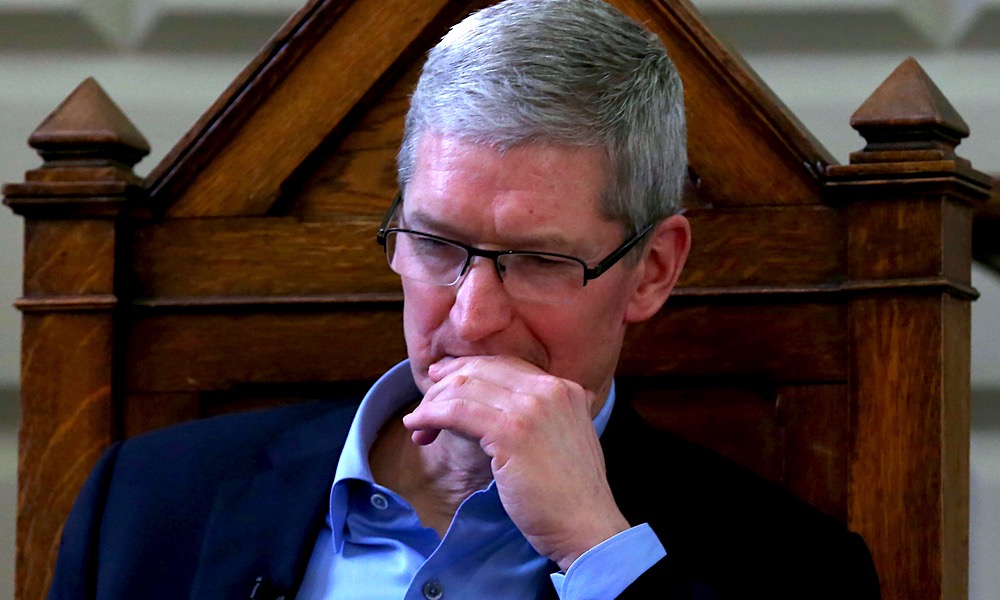Tim Cook Questions Whether a Vaccine Requirement for Apple Employees Is ‘The Right Answer or Not’
 Credit: Laura Hutton / Shutterstock
Credit: Laura Hutton / Shutterstock
Toggle Dark Mode
Although Apple has confirmed that its corporate employees won’t be expected to return to Apple Park until at least October, it appears that they may also need to be fully vaccinated before they do.
The latest news comes following a CNBC report that Google is looking at a similar back-to-work timeframe, except that any employees who come into the offices will need to be vaccinated before they’re allowed in.
In fact, despite the strong pushback over Apple’s return-to-work policies, Google’s plans sound oddly similar. The search giant had originally mandated a September 1 return date, at which point employees would be required to work in person for at least three days per week. Further, this policy was announced by CEO Sundar Pichai last December, who also told employees that they would all be “expected to live in commuting distance of [their] assigned offices.”
We actually heard very few protests from Googlers over this policy, yet when Apple announced similar plans back in June, a small but vocal group within the company started protesting the policies, accusing Apple of not respecting employee diversity or environmental concerns, and threatening to quit if the company didn’t work harder to accommodate those who wished to continue working from home.
Regardless, it appears that neither Google nor Apple’s policies have changed, and in fact, Google is taking a more hardline stance with its vaccination requirement — the first major tech company to do so.
‘The Right Answer or Not’
CNBC’s Josh Lipton spoke with Tim Cook yesterday regarding Apple’s perspective on what Google is doing. Cook confirmed that staff would not be required to return to Apple Park until “at least October” — something that Bloomberg’s Mark Gurman reported from other inside sources earlier this week.
However, Cook added that Apple hasn’t come to a decision yet on whether employees will be required to be vaccinated — either partially or fully — before they will be allowed to return.
At this point, Cook says Apple executives are more concerned about when employees should come back, and they’re still trying to decide whether a mandatory vaccine requirement is “the right answer or not” based on everything else that’s going on right now.
To be fair, Apple still has a bit of time to decide this. Not only is October two months away, but Apple has promised employees that it will provide employees with at least a month’s notice before they’re required to actually return.
While Google has announced a more specific return date of Oct 18 for its employees, Apple has yet to provide anything firm, and “at least October” could mean November or even later.
It’s also unclear exactly what Apple’s policies will be for those employees who are unwilling or unable to get vaccinated before the return date. Even Google, which appears to be firm on this requirement, has only said that “anyone coming to work on our campuses will need to be vaccinated,” but doesn’t elaborate on what it will do for unvaccinated workers.
To be fair, since Google’s policy applies to all of its offices worldwide, it’s making exceptions for those areas where vaccines aren’t yet widely available and there will also be a process in place to make exceptions “for those who cannot be vaccinated for medical or other protected reasons.”
As Covid cases continue to rise throughout the US due to the more contagious delta variant, the state of California announced that all state employees would be required to show proof of vaccination by August 2. State workers who aren’t vaccinated by that time will still be allowed to come to work, however they’ll be required to produce a negative Covid test at least once a week, or twice a week for those working in state healthcare facilities.
Presumably, if Apple does take the approach of a mandatory vaccination requirement, it will need to be put in place alongside some other administrative or disciplinary policy, lest it be abused by those users who simply prefer to work from home. This creates another thorny HR issue that Apple’s executives are going to have to factor in when deciding whether requiring employees to be vaccinated is “the right answer or not.”






